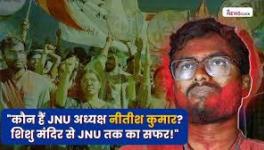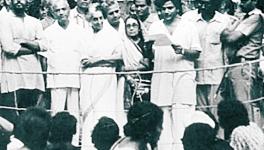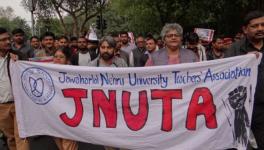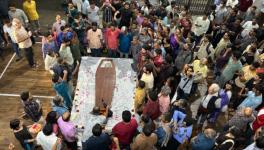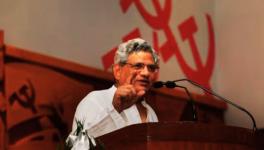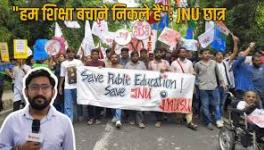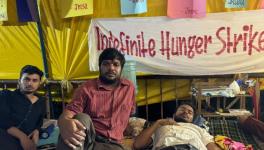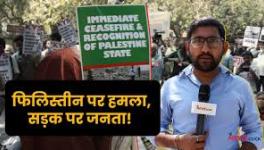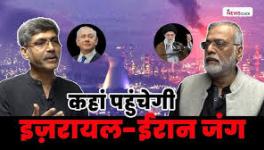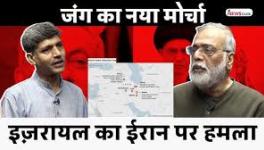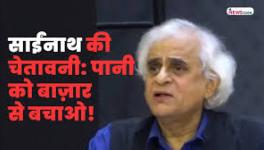Not a Clash or a Gang War, Onus of Violence in JNU on ABVP
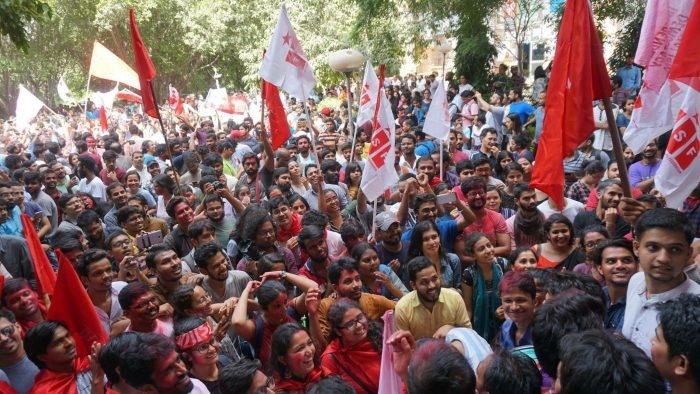
In the recently held JNUSU elections, ABVP activists stalled the counting process for more than 16 hours on the night of September 15, by occupying the room in which counting of votes was going on. Several activists of ABVP from Delhi University, armed with batons and sticks, entered JNU campus on the same night. When an SFI activist and former JNUSU general secretary went to lodge complaint against the outsiders for creating ruckus in JNU at Vasant Kunj North Police Station, she was beaten brutally outside the police station by some ABVP activists. All this happened when ABVP was losing JNUSU elections. During the counting process, several activists from of the United Left panel were threatened of dire consequences by the ABVP activists. Later, after the JNUSU election results were declared, ABVP members, led by the former joint secretary of JNUSU from ABVP, attacked AISA activists in Jhelum lawns around 2:30 am on September 17, with several activists being brutally hurt and hospitalised. Later in the morning, clashes broke out between ABVP activists and left activists at Periyar Hostel, with left mobilising people to hold a march against the violence of ABVP and ABVP mobilising their activists at Mahi Mandavi with batons and sticks. The newly elected president of JNUSU, N Sai Balaji, who was assaulted earlier that night was greeted with threats from more than 50 activists of RSS and ABVP when he went to file a complain at Vasant Kunj Police station.
This series of incidents, which later gained traction in Media, was portrayed as “clash between left and right”, with both resorting to violence in campus, which was later used as an excuse by JNU administration to impose a curfew in JNU campus by banning class campaigns, protests, marches and imposing harsh rules on hostel visits. There are several video evidence which have been circulating on social media, which clearly shows that it was always ABVP which unleased violence on left activists at several points, during the counting process as well as after the election results were declared. The narrative of ‘clash between left and right’ was later picked up by a section of people both within and outside the JNU campus, with several people calling it a ‘gang war’!
This narrative of labelling the violence perpetrated by ABVP on left activists as ‘clash’ or ‘gang war’, is very problematic, as first of all, it obscures the differential power relations between the two by putting both sides on an equal plane. In this narrative, the causes and instigators of violence are ignored, and only the incident is taken into consideration. The impunity granted to ABVP activists by both the JNU administration and security as well as Delhi Police is ignored completely. On the night of September 17, several calls were made to Delhi Police, whose PCR vans were parked outside the campus gate, but they reached the incident only after several left activists were brutally hurt. Balaji was dragged out of the PCR van, and was assaulted by ABVP activists, and later faced death threats just outside the Vasant Kunj police station, where he had gone to file a complaint. The same evening, when he was going to his hostel, he was stopped by the security guard, and was asked for an I-card, and was stopped by an ABVP activist who was adamant on not letting him inside his hostel. All this happened in the presence of security guards and hostel wardens.
This narrative of ‘clash between left and right’ was also employed during the Ramjas college violence last year. The violence which broke out on February 21 and 22 last year in Ramjas College was projected as “clash between left and right” by media, and was passively consumed by a section of intelligentsia. That whole incident and spree of violence which continued for two days, was nothing but an outcome of an attack on academic freedom and freedom of expression and of debate and discussion, by ABVP.
The ABVP activists resorted to stone-pelting at a seminar, whose topic and speakers went against their philosophy. In that incident too, the violence perpetuated on the day of seminar and next day was done in the presence of Delhi Police with no action being taken by Delhi University administration against several ABVP activists who could be clearly identified in several videos. The ABVP had resorted to violence then not because there was some threat of physical harm to them, but only because the whole idea of the seminar and next day’s rally went against their politics and philosophy. Similarly, in JNU, the ABVP resorted to violence not because there was any threat of physical harm to them, but only because they were losing the elections! This narrative of ‘clash’ or ‘gang war’ often overlooks this basic point of ABVP using violence to suppress any idea or outcome which goes against their politics and beliefs. The attack by ABVP on left activists was an attack on mandate of students of JNU, who decided to defeat the ABVP in JNUSU elections.
The incidents of violence in JNU were not between two groups which have same belief and practices and have equal access to institutions of state, but between a group which has got impunity and backing from both state and JNU administration, and is an active part of ‘project Hindutva’, against another group which has been at the receiving end of state oppression and apathy and attacks from JNU administration coupled with slander campaign for resisting the designs of Hindutva in university campus. Therefore, labelling the cases of violence in JNU between left and ABVP as gang war or clash is turning blind eye to undemocratic political praxis of ABVP and furthering its politics, by equating the self-defence or resistance by left against the attacks of ABVP backed by government and JNU administration.
Author is a Research Scholar in JNU
Get the latest reports & analysis with people's perspective on Protests, movements & deep analytical videos, discussions of the current affairs in your Telegram app. Subscribe to NewsClick's Telegram channel & get Real-Time updates on stories, as they get published on our website.











